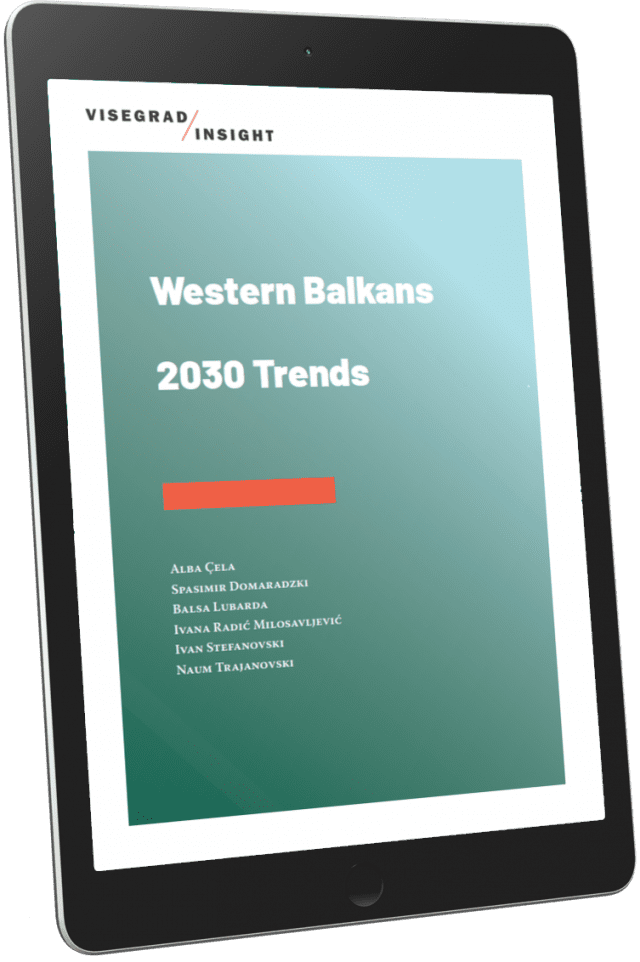
25 January 2021
In December 2020, Visegrad Insight presented a report on major Western Balkans Trends that will shape the EU’s policy framework with the southeastern neighbours in the next decade.
With the recently announced 2020 Enlargement Package and an Economic and Investment Plan for the Western Balkans, the region is on the top of the EU agenda. Promised the perspective of membership, the countries from the region move towards joining the block at an uneasy pace. What is the future ahead of the Western Balkans? What obstacles can the integration process encounter? Who and what actions can support it?
The European Union’s experience with the Western Balkans is an ambiguous one. On the one hand, the European Union plays a crucial role in the reconstruction, support and reconciliation of these countries, promotes regionalism and local ownership of cross-border initiatives, provides for security and promotes western values. On the other hand, the sluggish enlargement paths with unexpected stops and detours, an endless brain-drain, flirting with local autocrats and a growing gap between the Union and the candidate-states trigger frustration and exasperation.
While this love-hate relationship endures, other players leave their footprint on the region. The limits of the European Union’s soft power are cyclically tested by Russia. China, Turkey and Saudi are making inroads while the United States’ approach to the Western Balkans is reduced to piecemeal efforts and inconsistencies. These external factors reach the ground of a region locked between nostalgia for the past and uncertainty for the future. At a time when demographic trends are discouraging and the European Green Deal as well as the quest for innovation clash with the daily challenges of the ordinary people, there is a need to map the key triggers that in various combinations can steer the region in different directions.
 Against this background, Visegrad Insight is encouraging a discussion about the major trends that will shape the EU’s framework policy with the southeastern neighbours. In our thematic report Western Balkans 2030 Trends, we identify and explore major trends for the next decade, in the spheres of politics, democracy security, demography and society, economy, energy and environment as well as information and digital, that will shape the direction of policy discussions for the Western Balkans region.
Against this background, Visegrad Insight is encouraging a discussion about the major trends that will shape the EU’s framework policy with the southeastern neighbours. In our thematic report Western Balkans 2030 Trends, we identify and explore major trends for the next decade, in the spheres of politics, democracy security, demography and society, economy, energy and environment as well as information and digital, that will shape the direction of policy discussions for the Western Balkans region.
It is based on closed-door workshops and expert consultations that were held in the autumn of 2020. The aim of these events was to serve as a brainstorming framework comprising regional enthusiasts, intellectuals, scholars, journalists and stakeholders with the task of identifying the factors that will push the region in different directions.
The workshops brought together a group of regional leaders, experts and innovators from politics, think tanks, academia, business, media and civil society. Jointly, they worked to identify possible paths that the WB countries might take in the coming decade.
On 16 November, we organised an expert consultation event called “EU Integration for the Western Balkans – Completing Future Europe” with introductory remarks delivered by Patryk Błaszczak (Ministry of Foreign Affairs of Poland) followed by a discussion with Marta Szpala (Center for Eastern Studies), Vessela Tcherneva (European Council on Foreign Relations, Sofia) and Marko Savković (Belgrade Fund for Political Excellence, Belgrade Security Forum), moderated by University of Warsaw Professor and Visegrad Insight Fellow Spasimir Domaradzki.
The result of this work has been developed into a thematic report that is to fuel public debate and to shape EU strategies for the region. Read the report here:
The publication of the thematic report in December is accompanied by online presentations and discussions with audiences from Central and Southeastern Europe.
The report has been developed by Visegrad Insight of the Res Publica Foundation. It is co-financed by the Ministry of Foreign Affairs of Poland in the competition “Public Diplomacy 2020 – New Dimension”, but the analysis and opinions published in this report do not represent the official position of the ministry.